Seminar Series
Students as Co-Creators Spring Seminar Series 2025
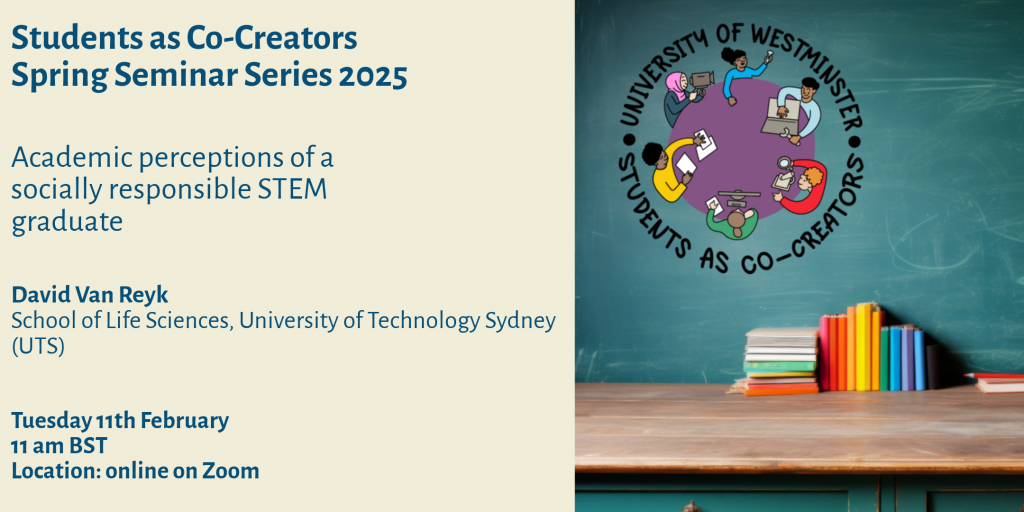
Title: Academic perceptions of a socially responsible STEM graduate
About the Event
“Social responsibility” is a graduate attribute/capability adopted across the UK, New Zealand, and Australian higher education sectors. The corollary of this is that, like all teaching disciplines, Science, and the Mathematical Sciences (SteMS) departments must embed learning outcomes in their curricula that align with their respective faculty and institution’s vision for a socially responsible graduate. Drawing upon frameworks of citizenship education promulgated for primary and secondary education, we designed a survey to investigate SteMS academics’ conception of, and practices for, embedding social responsibility-linked learning outcomes in their classes, subjects and degree courses. In this seminar, David will share what engaged university teachers can learn from existing citizenship education frameworks and the survey results. In the case of the latter, we have identified a broad range of conceptions of social responsibility which extends from safe and ethical professional practices to becoming agents of societal change. The survey also includes practitioners’ evaluation of the relevance of social responsibility-linked learning outcomes to their teacher and what are, or could be, enablers and barriers to any embedding process.
About the Speaker
David Van Reyk (he/him/his), School of Life Sciences, University of Technology Sydney (UTS), trained as a bench-side medical researcher before taking a bioscience lectureship at UTS in August 2000. He has previously been Director of Student Mobility and Engagement and Faculty liaison for Aboriginal and Torres Strait Islander students enrolled in the Faculty of Science. He also volunteers for the CSIRO STEM Professionals in School outreach program. Since 2020, David has been “teaching-focused” while continuing his research into student learning and success. He is currently completing an MA by thesis, and it is the work from his thesis project that he will be presenting.
Link: https://youtu.be/U4HG1ykStFw
Presentation: UoW Seminar
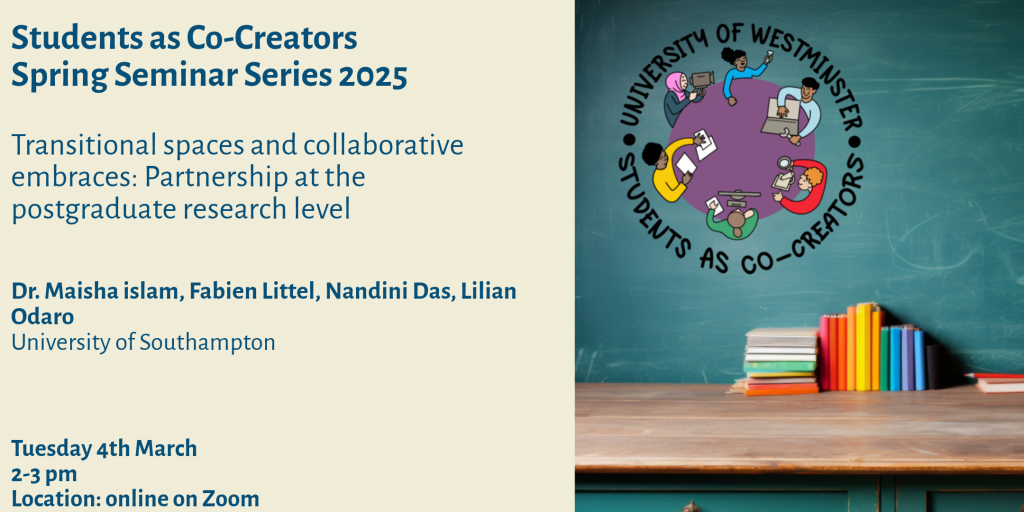
Title: Transitional spaces and collaborative embraces: Partnership at the postgraduate research level
About the Event
This presentation highlights the marginalisation and epistemic silence experienced by postgraduate research (PGR) students who face a myriad of issues within the broader research community/culture. Often occupying the liminal space between student and staff, doctoral students are largely absent in conversations related to student engagement and staff retention in academia. We therefore describe our attempt to dismantle such inequities, whilst retaining social justice and liberatory values within an institutional setting, through our award-winning PGR Student Partners scheme. We report on our approach which is centred on values of partnership, co-creation and equity, highlighting how this ethos enabled empowerment and activism of our Student Partners. We also describe the tangible outputs, impact and experiences of our Student and Staff Partners involved in the scheme whilst recognising the challenges that arise when implementing EDI work within universities. Finally, we provide key reflections for staff seeking to enhance PGR research culture and their institutional co-creation offering.
About the Speakers
Dr Maisha Islam is a Research Culture Lead for Equality, Diversity and Inclusion at the University of Southampton’s Doctoral College. She is a co-editor of the recently published book, Uncovering Islamophobia in Higher Education: Supporting the success of Muslim students and staff.
Fabien Littel is a postgraduate researcher / PhD student in organisational studies and business ethics at Southampton Business School, University of Southampton. His research focuses on micro-level environmental ethics in the oil and gas industry.
Nandini Das (she/her) is a PhD candidate at the University of Southampton, Department of Sociology, Social Policy and Criminology. Her research looks at women in informal and unfree labour relations in India.
Lilian Odaro is a PhD candidate at the University of Southampton, Department of Gerontology. Her research focuses on the care practices of informal caregivers of older people with dementia in Nigeria. She is also a Doctoral College Development Associate at King’s Doctoral college.
Link: https://youtu.be/0hzfScBCLP8
Presentation: Download Here
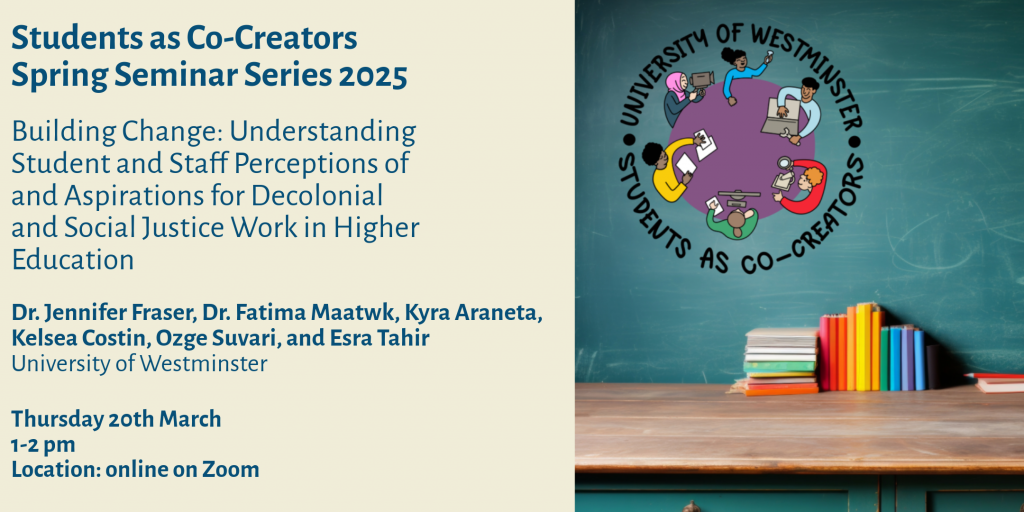
Title: Building Change: Understanding Student and Staff Perceptions of and Aspirations for Decolonial and Social Justice Work in Higher Education
About the Event
Prompted by events such as the murder of George Floyd (James, Joseph-Salisbury, and Gooden, 2022) and movements like Rhodes Must Fall (Elliot-Cooper, 2018), calls for social justice and decolonisation have gained momentum. As universities reassess their commitments to these issues, the alignment between institutional priorities and student activism continues to vary (Memon and Jivraj, 2020; Bhambra, Gebrial, and Nişancıoğlu, 2018).
We present preliminary findings from a university-wide study on student and staff understandings of decolonial work. Through the larger scale offered by a survey, we aim to understand participants’ conceptualisations of decolonisation, perceptions of change agents, and aspirations for decolonial initiatives. Recognising that decolonial work is not just about outcomes but also about ways of being and working together, we centre decolonial relationality and partnership as both a theoretical and ethical framing (Fraser and Usman, 2021; Yahlnaaw, 2019). This approach informs not only our analysis but also our collective efforts to build a research culture that enables meaningful decolonial pedagogical partnerships.
About the speakers
Kelsea Costin (she/her) is a Research Assistant for the Pedagogies for Social Justice project (PSJ). Whilst completing her BA in Sociology in 2023, Kelsea joined the PSJ as a Research Intern. In her current role as a Research Assistant, she has continued to contribute to the field, conducting university-wide research. Her most recent publication on student and staff perceptions on decolonising the curriculum has appeared in a special edition centring social justice and pedagogical partnership in Social Sciences. Kelsea has presented at multiple events connected to teaching, learning and social justice, including international and national conferences. As part of a student-staff collaboration, Kelsea believes that relationality and student-staff partnerships are crucial for dismantling institutional structures and challenging coloniality in the academy. After she completes her MA in Cultural Studies at SOAS, University of London, she is keen to prioritise student-driven knowledge production and decolonial and anti-racist work in academic communities.
Ozge Suvari (she/her) is a doctoral researcher in the School of Architecture + Cities at the University of Westminster. Her research interest includes Anthropocene histories, ecologies and beings with a particular focus on the role of drawing in deciphering the climate crisis. Before her doctoral studies, she was an adjunct lecturer and practising architect in Turkey, where she was committed to designing public spaces and buildings in environmentally responsible ways. Since January 2024, she has been a research intern on the Pedagogies for Social Justice (PSJ) project and a student ambassador with the Student Partnership team. Navigating in academia as a both student and lecturer, she is committed to partnership and social justice as fundamental to shaping research, teaching, and learning.
Link: https://youtu.be/GQaS_CYPtLg
Presentation: Access Here
Students as Co-Creators Spring Seminar Series 2024
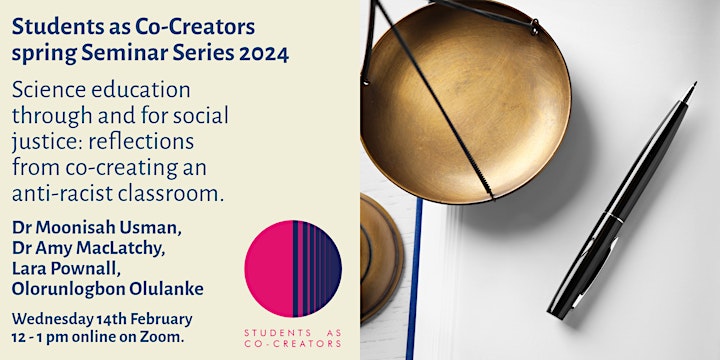
Title: Science education through and for social justice: reflections from co-creating an anti-racist classroom.
About the Event
There are important questions about who higher education serves in the UK. Degree awarding gaps highlight inequitable outcomes for racially minoritised students (Universities UK International, 2022). This ongoing issue is described as a ‘wicked problem’, rooted in structural racism, making it clear that ‘it is the system and not the student that is the root of the problem’ (Ugiagbe-Green and Ernsting, 2022). In a similar vein, structural racism reinforces racial health inequalities in society (Raleigh, 2023). We know that the problem is not with brown or Black bodies but with the system. Both issues encourage us to reimagine our classroom as anti-racist, where we support racially minoritised students and equip them to make social change. As Tuck and Yang (2018, pp. 5) argue, ‘social justice is the ghost in the machine of the educational apparatus. It is the only part that makes any part of the field of education matter’.
About the Speakers
Dr Moonisah Usman is Lecturer in the Centre for Education and Teaching Innovation (CETI), University of Westminster. She is a British Pakistani Muslim who grew up in London and developed a commitment to supporting minoritised students in higher education. In the CETI, she teaches on thefoundation programme, leading a core university-wide module ‘Critical Thinking for Academic and Professional Development’. She also leads the level 5 module ‘Power, Privilege and Public Health Challenges’, which combines her interest in health disparities and social disadvantage. Moonisah’s background is in obesity and molecular genetics research, and her current works explores environmental, nutritional, and social determinants of genome health. She is also a part of the Centre for Social Justice Research where she investigates how student partnership and anti-racist pedagogy can produce more equitable outcomes for higher education and society.
Dr. Amy MacLatchy (she/her) is a middle aged, middle class, white Australian mother, living in London. She started her academic journey as a mature-aged, First in Family Foundation student at the University of Westminster. Having graduated with a degree in Biochemistry, she went on to complete a PhD investigating a novel drug delivery system to treat diseases of the brain. She is a Lecturer in the Centre for Education and Teaching Innovation (CETI), University of Westminster recently, teaching on the core modules Introduction to Academic Practice and Critical Thinking for Academic and Professional Development. It was through working with her colleague Dr Moonisah Usman that she was first introduced to social justice, and the power of co-creation with students and applying these aspects to their Life Sciences curriculum to engage in anti-racist practices. This has developed her pedagogical practices resulting in the co-delivery, with Moonisah and their students, of workshops exploring student partnership projects and developing an anti-racist curriculum.
Lara Pownall (she/her) is a first-year BSc Biomedical Science student at the University of Westminster. As a mature student who entered higher education through a foundation year, Lara was engaged in student partnerships to impact pedagogical practices to create a more socially just learning environment that actively listens to and responds to the needs of students. Lara has used her experiences of learning at university to co-deliver workshops on how student partnerships can help build a decolonised life sciences curriculum. She is also a Pedagogies for Social Justice Steering Group member at the University of Westminster. Lara is particularly interested in clinical cellular pathology, especially in fetal medicine and gynaecology. Her time learning about research in this field at the University of British Columbia, Canada, inspired her to delve deeper into this topic during her studies. She works part-time as an inpatient Healthcare Assistant in the NHS.
Olorunlogbon Olulanke, a first-year student here at the University of Westminster studying to get my bachelor’s degree in human nutrition. I took a foundation year last year which proved in all ways to be one of my best decisions yet. The year truly inspired me greatly and prepared in many ways for the rest of my years in university. During my foundation year, I studied both the Introduction to Academic practice and the Critical thinking for Academic and Professional development modules and I am glad to have the perspective and skills that I picked up from those modules. Both modules helped me discover things about myself that I didn’t know before and ignited a curiosity to learn and find out more about life and the sciences concerning it. I am glad to be able to share my experience with these amazing modules with my peers and watch them have a just as good experience as I did.
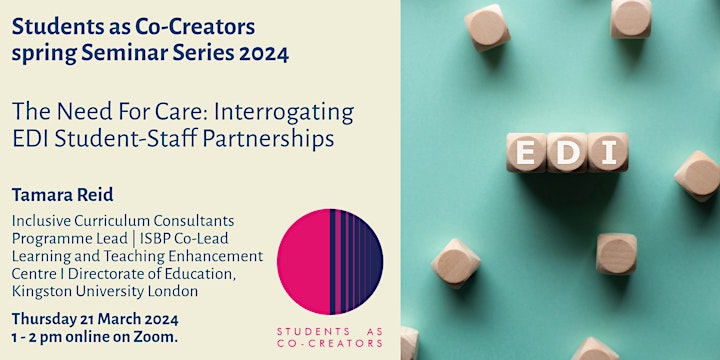
Title: The Need For Care: Interrogating EDI Student-Staff Partnerships
About the Event
Through the eyes of the composite character of Lauryn Mensah who is a BAME ambassador, we will be exploring the rise of Equality, Diversity, and Inclusion Student-Staff Partnerships and experiences of Black students within these programmes. Aim of this session is to provide a counternarratives that ‘lovingly critique’ (Paris and Alim, 2014) the claims that EDI Student Staff Partnership ‘positively shift traditional power hierarchies’or ‘empowers and liberates Black students’. In doing so, bringing to the forefront distinct experiences of Black Student Partners which are not only deemphasised but missing in the literature that is both dominated by staff and white people (Mercer-Mapstone et al., 2017; de Bie, 2021). The session will leave you with important questions and tools to think more intentionally about your student staff partnership programmes.
About the Speaker
Tamara Reid is Inclusive Curriculum Consultant Programme Lead at Kingston University, where she supports the development of an inclusive curriculum through student-staff partnership. She has worked previously at both the University of Hertfordshire and the University of Bath in supporting student success, student engagement and curriculum development with a strong focus on inclusion. The Inclusive Curriculum Consultant Programme allows students to be involved in the development of curricula, share their voices and perspectives, working in partnership with staff. Tamara recognises partnership as empowerment and will share her reflections from the programme.
Link: https://youtu.be/CflZ2-N0FbE
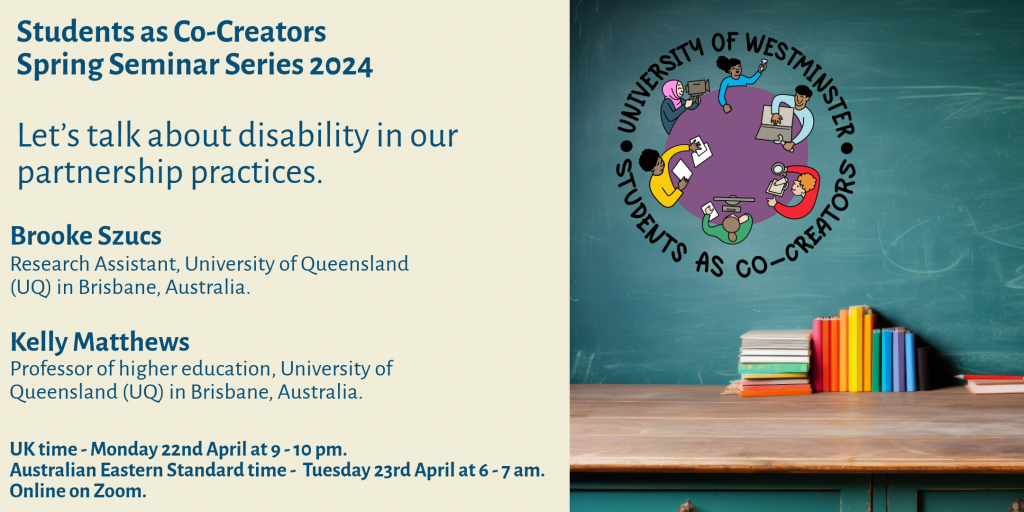
Title: Let’s talk about disability in our partnership practices
About the Event
Join Brooke and Kelly for an informal yet informative conversation on the place of co-creating more equitable and inclusive spaces in higher education with and for people with disabilities. Both Brooke and Kelly have spent years working in, researching, and advocating for student-staff partnership. Brooke also brings lived experience of disability as a staff and student partner combined with current advocacy and research roles supporting people with disabilities in higher education. They will share practices and discuss how partnership values can enable humanising conversations. In doing so, they will surface ways to leverage partnership discourse to push through institutional processes that include people with disabilities and delve into risks of harm possible in such work.
About the Speakers
Brooke Szucs is a Research Assistant at the University of Queensland (UQ) in Brisbane, Australia. She works at both the TC Beirne School of Law and UQ Business School on projects supporting those with disabilities into higher education and the workforce.
Kelly Matthews is a professor of higher education at the University of Queensland (UQ) in Brisbane, Australia. She teaches in the field of education, researches student voice and partnership, and serves as an elected member of UQ’s academic board.
Link: https://youtu.be/hu1NR4Nq9Qc
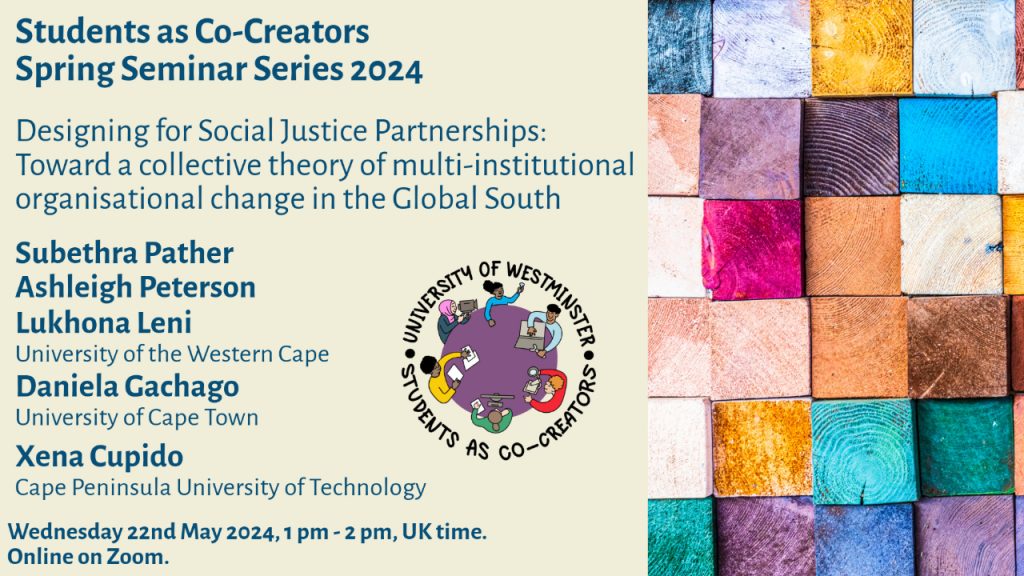
Title: Designing for Social Justice Partnerships: Toward a collective theory of multi-institutional organisational change in the Global South
About the Event
The recent student protest movement in South Africa marked the call for transforming the academic landscape through increased co-creation of the curriculum. If we believe in organisational change that embraces an ecosystemic approach, we need to identify and involve all constituents, across the micro, meso and macro levels, to design curricula that cross over differences and power imbalances. In the past, the Student as Partners (SaP) movement was focused on creating equal opportunities for students and staff to engage in curriculum design and facilitation. More recently prominent voices in the SaP literature have started to engage with questions on power and difference, moving towards a more equity-oriented approach to student-staff partnerships (see for example De Bie, Marquis, Cook-Sather and Luqueno, 2023). We join these scholars in problematising the idea of Students as Partners toward a student-staff partnership approach that acknowledges and works within differences and power differentials and considers context (Looker, 2018). This paper introduces preliminary findings from an on-going, three-year project designed to explore and facilitate the co-creation of curricula, aiming to create a dynamic and constantly changing “living curriculum” involving staff, students and other stakeholders of our ecosystem with an emphasis on equity-oriented learning design. The project includes three differently positioned higher education institutions in South Africa and one university in Egypt; each of which has identified instructorstudent teams to participate in the redesign of a course according to socially just principles. Framed by a variety of lenses on co-creation, such as Freire’s critical pedagogy, the Student as Partners/Student Engagement movement, decolonisation and participatory design methodologies, we will present our first emerging theory of change developed through a series of workshops. This theory of change will be framed by emergent design strategies that emphasise context, connection, culture, justice, equity and care. Applying our theory of change across four different institutions, each with its own unique challenges, opportunities and distinctive contexts allows us a structured yet flexible pathway to developing and sustaining partnerships in a context-sensitive way, fostering capacity-building, collaboration and ecosystem development within these partnerships.
About the Speakers
Prof Subethra (Su) Pather is currently the Learning & Teaching specialist in the office of the Deputy Vice-Chancellor Academic at the University of the Western Cape (UWC). She plays an important role in enhancing UWC’s student success initiatives. Prof Pather is UWC’s Lead for the Siyaphumelela Student Success project funded by the Kresge Foundation. She is Deputy President of the Higher Education Learning and Teaching Association of Southern Africa (HELTASA). Prof Pather is the manager of UWC First Year Experience (FYE), First Year Peer Mentoring, Academic Advising and Tutor Enhancement Program at an institutional level. She is also involved in a regional project on Designing for Social Justice Partnership (DSJP) in South Africa and an international project on Mentoring Meaningful Learning experiences at the Center for Engaged Learning at Elon University in USA. Her research interests are located within the higher education field with a particular focus on supporting first-year student access, transition, retention, and success. Her extensive academic publications and academic presentations are located in this field. She is also involved in several national and international networks in first-year experience and student-staff partnerships to advance student success in South Africa and her research agenda.
Daniela is an Associate Professor at the Centre for Innovation for Learning and Teaching (CILT) at the University of Cape Town. Her current research focuses on academic staff development for designing blended and online learning in higher education, with a particular focus on developing socially just learning and curriculum designs based on co-creation and equity-oriented compassionate design principles. She teaches on the PG Diploma in EdTech, the Masters in EdTech and convenes the Masters in Higher Education Studies (HES) at UCT. She completed a Masters in Adult Education at the University of Botswana and received a PHD from the School of Education at the University of Cape Town. She is a C1-rated researcher and 2022 Fulbright Scholar who has published more than 80 peer-reviewed articles and book chapters. She is the managing editor of CriSTaL, the journal for critical studies in teaching and learning in higher education. She blogs at http://danielagachago.blogspot.com and tweets under @dgachago17
Xena Cupido holds the position of Director at the Fundani Centre for Higher Education Development, at the Cape Peninsula University of Technology. Her scholarly pursuits centre around the critical domain of student engagement and success, with a specific focus on participatory learning, holistic student engagement, and designing for social justice. Recently, Dr. Cupido has also demonstrated a growing interest in the integration of digital technologies as an instrumental pedagogical tool to optimize the process of learning and teaching. Xena has actively engaged in projects focused on learning and teaching, student academic development, and the fundamental pursuit of social justice within the realm of higher education. Her focus extends to cocreating curriculum frameworks, implementing participatory student engagement practices, promoting access, and effectively addressing youth needs to enhance overall success. On a national level Dr. Cupido has established collaborations through involvement with the Siyaphumelela Network and the TAU Fellowship which advances teaching at the university. These associations are centered on bolstering institutional capacities to provide holistic support for students.
Ashleigh Petersen-Cloete is a PhD Candidate in the Desmond Tutu Centre for Religion and Social Justice at the University of the Western Cape, South Africa. Her research focuses on social justice and religion, specifically on gender and purity culture on TikTok. Ashleigh is a Researcher for the Design for Social Justice Partnership Project.
Lukhona Leni is a dedicated scholar with a Master of Commerce in Information Systems. She is propelled by an unwavering passion for pioneering research and a steadfast academic commitment. Currently pursuing a PhD at the University of the Western Cape, Lukhona aspires to make substantial contributions to the academic community by advancing the frontiers of knowledge in the field, cultivating innovative solutions, and fostering the intellectual growth of future scholars.
Link: https://youtu.be/IYzZYsGoHJ0
Presentation: https://drive.google.com/file/d/1LBuO_lUYEOvFKCMplkhxQhVcKAIAG4pa/view?usp=sharing [PDF]
Students as Co-Creators Spring Seminar Series 2023
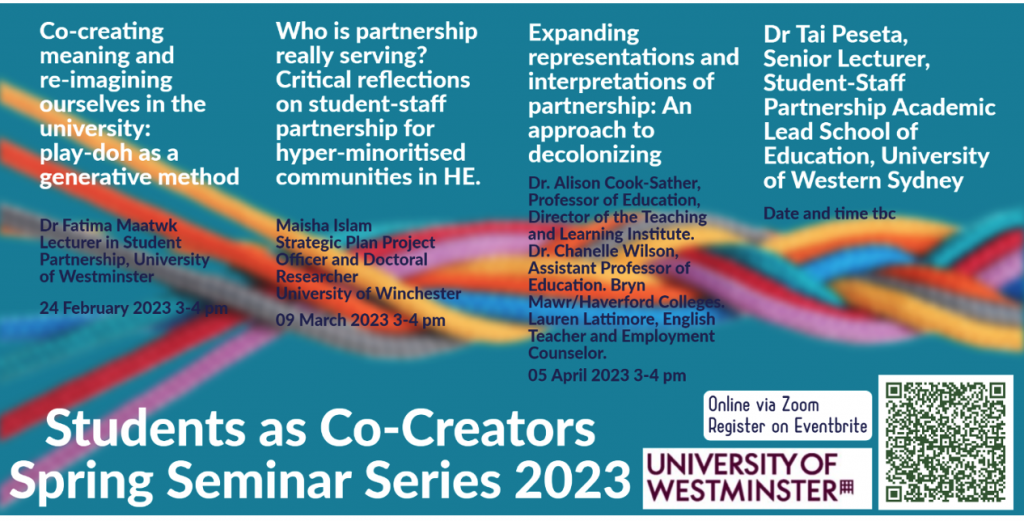
Title: Co-creating meaning and re-imagining ourselves in the university: play-doh as a generative method
Description: Building meaningful partnership relationships and co-creating our learning and teaching realities require trust and a safe space. In this Seminar, Fatima will reflect on using play-doh as a method for collectively co-creating meaning in student partnerships. Moving away from traditional research methods, which often mirror the imbalanced power dynamics in HE, we use play-doh as a generative and creative method to centre our partnership relationships on trust and care. It is a process that allows meaning to iteratively emerge and allows us to connect with parts of ourselves in a way that asking and answering questions or writing about concepts does not. The process of collectively reflecting and building our models allows us to ‘feel’ our way through the answers to our guiding questions. In doing so, we aim to disrupt how knowledge is produced and circulated in institutions.
Dr Fatima Maatwk is Lecturer in Student Partnership, in the Centre for Education and Teaching Innovation at the University of Westminster, and will be joined by respondents Rifa Ferzana, BA Computer Sciences Student & Student Partnership Ambassador, University of Westminster and Dr Andy Pitchford, Head of the Centre for Education and Teaching Innovation, University of Westminster.
Link: https://youtu.be/qvOcXlAS7bg
Presentation: Co-Creating meaning through play-doh [PDF]
Title: Who is partnership really serving? Critical reflections on student-staff partnership for hyper-minoritised communities in HE.
Description: There is no doubt that partnership work has begun to embed and advance equity and inclusivity for certain minoritised students across our global HE systems. From institutional student-staff partnership schemes in the UK (e.g., Westminster’s Students as Co-creators programme) and North America (e.g., Bryn Mawr College’s Students as Learners and Teachers programme), to sector organisations dedicated to promoting such practice (e.g., National Student Engagement Programme; RAISE Network; Student Voice Australia). However, critical reflection on who such work has been serving is important if our practice is to remain agile, adaptable and flexible to the needs of all students from all backgrounds.
In this session, Maisha reflects on her partnership work which has focused on Asian and Muslim students, respectively. These groups of students (and staff) represent a hyper-minoritised population within HE who are often rendered invisible when it comes to our partnership work with an equality, diversity and inclusion lens. Following reporting some of this work and practice, Maisha will provide some key recommendations to move our partnership working forward.
Maisha Islam is the Strategic Plan Project Officer at the University of Winchester, whilst also studying for a professional doctorate in Education. Maisha’s main research interests lie in the area of Black, Asian and minority ethnic student experience, and Muslim student sense of belonging/student voice in Higher Education, where she presents, writes and has published on these topics. Maisha is heavily invested in the area of race and religious equality in Higher Education. For example, Maisha has sat on Universities UK staff panels which developed guidance for universities tackling racial harassment and Islamophobia on campus. Additionally, Maisha is also the co-Chair of the Research England/Office for Students BAME PGR Steering Group and recently finished a two-year term on the Office for Students’ Student Panel.
Maisha is joined by respondents Kyra Araneta, International Relations MA student and Student Partnership Research Assistant, Centre for Education and Teaching Innovation, University of Westminster, and Dr Moonisah Usman, Lecturer in Foundation Learning, Centre for Education and Teaching Innovation, University of Westminster.
Link: https://youtu.be/nEnHJpl1GO0
Presentation: Who is partnership really serving – Maisha Islam [PDF]
Title: Expanding representations and interpretations of partnership: An approach to decolonizing
Description: In this seminar a former student partner (Lauren) and two academic staff members (Alison and Chanelle) share how we have used both art and narrative to expand what and how stories are told about the potential of student-staff partnership as decolonial tools. Drawing on Lauren’s paintings (including this and this), a wider range of media (curated
by Alison and several co-editors of International Journal for Students as Partners), and a blog (written by Chanelle), we highlight the potential of storytelling through art and word. How can these art forms expand our understanding and inspire partnerships that are more equitable, inclusive, and healing? How might art and narrative further decolonial efforts in academic spaces?
Dr. Alison Cook-Sather is Mary Katharine Woodworth Professor of Education at Bryn Mawr College and Director of the Teaching and Learning Institute at Bryn Mawr and Haverford Colleges in the United States. Alison has developed internationally recognized programs that position students and teachers as pedagogical partners, published over 100 articles and book chapters, and spoken or consulted on partnership work at over 80 institutions in 13 countries. Author or co-author of eight books, including Pedagogical Partnerships: A How-To Guide for Faculty, Students, and Academic Developers in Higher Education (2019), Promoting Equity and Justice through Pedagogical Partnership (2021), and Co-Creating Equitable Teaching and Learning: Structuring Student Voice into Higher Education (2022), she is founding editor of Teaching and Learning Together in Higher Education and founding co-editor of International Journal for Students as Partners. Learn more about Alison’s work at https://www.alisoncooksather.com/
Dr. Chanelle Wilson is an Assistant Professor of Education in the Bryn Mawr/Haverford Colleges Education Program, and the Director of Africana Studies at Bryn Mawr College. She enjoys facilitating knowledge in a way that encourages personal connections, promotes critical thinking, highlights contemporary relevance, and necessitates justice. Her current scholarship focuses on race and anti-racism in education, decolonization of schools and the mind, students as teachers and learners, and culturally relevant pedagogy in international schooling contexts. Dr. Wilson has a passion for using research to improve the educational experiences of marginalized groups, promoting equity and critical race-focused conversations: her life’s goal is to rethink, reimagine, and revolutionize education to meet the needs of all children.
Lauren Lattimore is an english teacher and employment counselor supporting adults with disabilities in finding work opportunities. As an educator, Lauren is committed to creating joyful and transformative learning spaces. Lauren is also a pianist and artist who enjoys drawing- and calligraphy-based practices. Lauren graduated from Bryn Mawr College in 2021 with a B.A. in sociology and minors in education and Africana Studies.
Presentation: Westminster Students as Co-Creators Seminar Series 2023 [PDF]
Title: Curriculum creation as co-inquiry about the University
Description: From 2017-2022, I led a university-wide strategic curriculum transformation project called 21C Transforming Curriculum (21C TC) which involved hundreds of staff, at least fifty student partners, and ten or so external partners, all engaged in curriculum co-creation together. Framed by the concept of Partnership Pedagogy (Barrie & Pizzica, 2019), like many strategic projects of this kind, when the funding nears an end, the frenzy of activity to evaluate its outcomes and outputs against a set of metrics, becomes especially heightened. Witness the scene: the search for data and evidence to anchor claims; countless presentations to stakeholders and partners; an expectation that the learning from the project becomes seamlessly embedded into the ‘business as usual’ habits, routines, rhythms, regularities of the university. Not only that, stories and whispers circulate about the depth of change and the extent of transformation; in some cases, artefacts find their way into the socio-material spaces of practice; and terms like ‘legacy’ haunt the project’s remains. For staff, these kinds of strategic projects are often par for the course (universities are constantly refreshing their curriculum in one way or another); for student partners however, there is a pedagogical task at hand to apprehend the process they have been part of. What does the process of contributing to strategic curriculum transformation look, and feel like, to students? What change do they experience, if any? What have they learned? What ought to be done differently next time from their perspective? In this talk, I focus on the experiences of my colleagues – the team of student partners who have worked alongside me – to ask critical questions about partnership, identity, relationality, and the University.
About the speaker: Tai is Senior Lecturer in the Educational Partnerships and Quality Portfolio at Western Sydney University. She is a higher education researcher who works, practises, and writes in the areas of student-staff partnership, curriculum transformation, academic development, doctoral education, and their relation to an idea of the University. From 2017-2022, she was the Academic Lead of the Transforming Curriculum stream 21C project at Western Sydney University which brought together staff, students and external partners as inquirers, makers, and creators of transdisciplinary curricula. Tai now leads an institutional strategy with a team of WSU Student Partners to scale student-staff partnership beyond curriculum.
Students as Co-Creators Seminar Series, Spring 2022
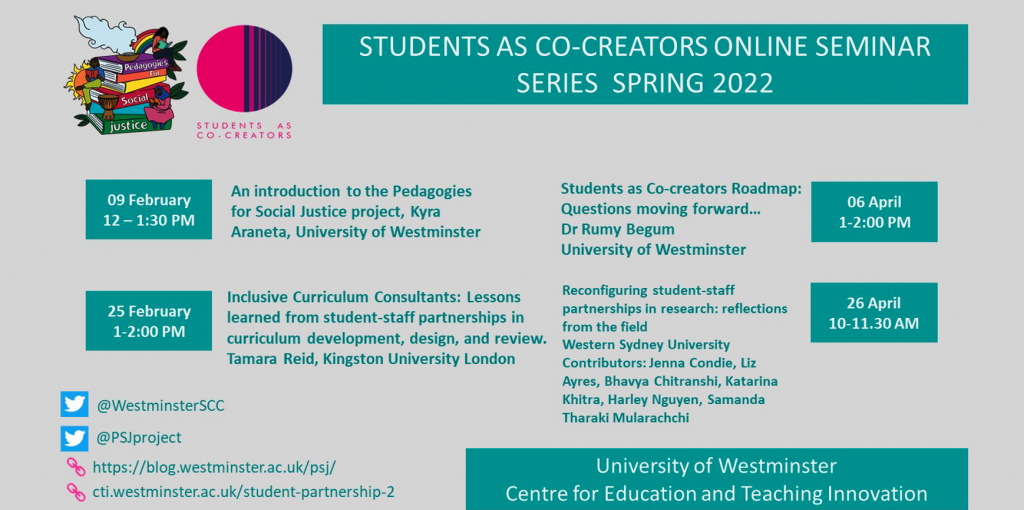
Seminar 1: An introduction to the Pedagogies for Social Justice project, 9th February 12 – 1:30 pm, Speaker: Kyra Araneta
Watch the seminar recording here: https://youtu.be/_V4CYkGIuM4
The first presentation in the ‘Students as Co-Creators’ spring seminar series will be an introduction to The Pedagogies for Social Justice (PSJ) project at the University of Westminster. Situated at the intersections of decolonising, anti-racist and partnership work, the project takes an interdisciplinary approach, recognising the complex and nuanced nature of social justice work in higher education. Placing student-staff partnership at the forefront, the project is also dedicated to uncovering the colonial legacies that are present in our curriculum and classrooms, as a means of co-producing tools and practices that can help us to mitigate and understand them. In this seminar, we will discuss the different elements of the project (reading lists, glossary, podcast, study group and steering group), whilst reflecting on their production in relation to student-staff partnerships. We hope this talk provides insight into what to expect from the rest of the series, but also inspires your own social justice work to operate in partnership as a next step to new, effective and critical ways of understanding academia.
About the speaker: Having recently completed her undergraduate degree in Sociology at Westminster, Kyra has continued her studies for a Master’s in International Relations. As a woman of mixed African-Asian descent, identity work has been a complex task for Kyra, but nevertheless a process that has also inspired her efforts towards creating decolonial and anti-racist tools and spaces in the academy. Approaching her final years in education, she hopes that her work on the project can help to transform the ways we think about and engage with pedagogy at Westminster.
Respondents: Kyra will be joined by Dr Fatima Maatwk, Student Partnership Lecturer, Centre for Education and Teaching Innovation, University of Westminster, Cheyenne Holborough, Creative Writing and English Literature Student, University of Westminster and member of the Pedagogies for Social Justice Steering Group, and Hafsah Ahmed, Social Sciences Student and Pedagogies for Social Justice Glossary author, University of Westminster.
Introduction to the Pedagogies for Social Justice project (Slides – PPT)
Seminar 2: Inclusive Curriculum Consultants: Lessons learned from student-staff partnerships in curriculum development, design, and review, 25th February 1– 2 pm, Speaker: Tamara Reid, Inclusive Curriculum Consultants Programme Lead at Kingston University
Watch the seminar recording here: https://youtu.be/hDU8nMLtoQ8
The Inclusive Curriculum Consultant Programme allows students to be involved in the development of curricula, share their voices and perspectives. Staff working in partnerships with the programme have the opportunity to work with and learn from a diverse student perspective leading to the review of teaching materials, and discussions of how a particular module or course can be redesigned and changed to be more inclusive and accessible to our diverse student body.
In this talk, I will bring you on my journey of redesigning the programme and discussing my lessons learned and critical reflection from the last year of running the Inclusive Curriculum Consultants. Looking at issues of allyship, learned helplessness, evaluation, and partnership as empowerment.
It is my hope that this talk provides you with some food for thought in relation to your own programmes. As well as providing us an opportunity to be discussing our journeys of becoming in student-staff partnerships.
About the speaker: Tamara Reid, Inclusive Curriculum Consultants Programme Lead at Kingston University
Respondents: Elantha Evans, Senior Lecturer in Architecture and Cities and Students as Co-Creators Academic Partner, University of Westminster, and Kyra Araneta, Student Partnership Research Assistant and Master’s in International Relations Student, University of Westminster.
Seminar 3: Students as Co-creators Roadmap: Questions moving forward…, 6th April 1 – 2 pm, Speaker: Dr Gulshanara Rumy Begum
Watch the seminar recording here: https://youtu.be/nOUKwChTzeY
In this seminar, Rumy will take you through her experiences of student-staff partnerships over the last few years and share some of the specific projects she has been involved in. In addition, she will disclose her reflections on questions she feels need attention as we move forward in partnership work.
About the speaker: Dr Gulshanara (Rumy) Begum is a Senior Lecturer in Nutrition and Exercise Science, in the School of Life Sciences, at the University of Westminster. Rumy has a BSc (Hons) in Biological Sciences, a PhD in Sports Nutrition, a Masters in Higher Education and is currently a fellow of HEA. She has taught in Higher Education for over 15 years, across both undergraduate and postgraduate modules. Her teaching is very much student-centred, research-informed and hands on. She strongly believes in “learning by doing” and feels such practices enable students to retain more and gain a deeper understanding. Rumy also has extensive experience with student-staff partnership projects. She believes time and mindful effort are crucial to developing true non-hierarchical partnerships. In 2020, along with students and staff, she took part in writing a book chapter titled: I’ve Seen You (Fraser et al. 2020) within the book, The Power of Partnership, edited by Mercer-Mapstone and Abbot (2020).
Respondents: Nishat Tasnim, Students as Co-Creators Ambassador and Andy Pitchford, Head of Centre for Education and Teaching Innovation.
Seminar 4: Reconfiguring student-staff partnerships in research: reflections from the field, 26th April 10 – 11:30 am, Speakers: Jenna Condie, Katarina Khitra, Samanda Tharaki Mularachchi, Harley Nguyen, Liz Ayres, Bhavya Chitranshi
Respondents: Kyra Araneta, Student Partnership Research Assistant and Master’s in International Relations Student, University of Westminster.
Watch the seminar recording here: https://youtu.be/3bNyjZL0-Qg
At Western Sydney University (Australia), partnership pedagogies and student-staff partnerships are being supported and embedded for curriculum innovation through the University’s 21C Curriculum Project. In this seminar, we take student-staff partnerships into a research context by reflecting upon our collaborative approach to the Summer Research Scholarship Program, which provides opportunities for undergraduate students to experience university research. We draw from our participatory practices of a ‘collective reflective’ journal, shared readings and podcast listening, co-analysis and co-writing, regular Zoom meetings, and a Facebook Messenger chat. Through these research artefacts, we reflect on how we found common ground in crises and connected with one another through digital platforms to identify how we can think, research and act together towards a more just university, and a more just world.
Students as Co-Creators Seminar Series, Spring 2021
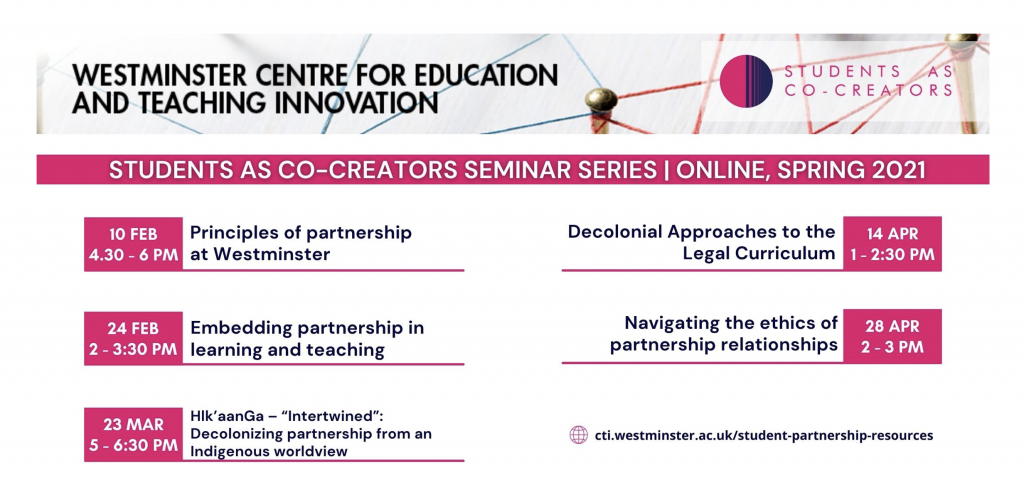
Seminar 1: Principles of partnership at Westminster, 10th February 4:30 – 6 pm, Speaker: Dr Fatima Maatwk
Watch the seminar recording here: https://youtu.be/8V_XY4Lr0ZE
At Westminster we view partnership as a reciprocal process in which we share responsibility for shaping our learning and teaching environments and experiences. We work through a co-creation model of partnership which encourages students and faculty to build collaborative and reciprocal relationships of learning. Student partnership is an area of development in the Centre for Teaching Innovation and across Westminster. We have a well-established Students as Co-Creators Project and we are currently looking at expanding student representation across the institution and moving co-creation into the curriculum.
About the speaker: Dr Fatima Maatwk is a lecturer on the Student Partnerships Programme at the University of Westminster. Fatima completed her doctorate at Westminster University. Her research was on lived diversity perceptions and experiences in a cross-cultural setting. Her approach is interdisciplinary in the fields of diversity management, social psychology and cultural studies. Currently, her work is focused on the University’s Co-Creation programmes and decolonisation project. She is also a lecturer and Equality, Diversity and Inclusion researcher at Westminster Business School.
Respondents: Kiu Sum, Doctoral Researcher at the University of Westminster and Students as Co-Creators Ambassador and Dr Jennifer Fraser, University Director of Student Partnership, Centre for Education and Teaching Innovation, Principal Lecturer, School of Social Sciences, National Teaching Fellow 2016.
Principles of partnership at Westminster (Slides – PDF)
Find out more: http://cti.westminster.ac.uk/student-partnership-2/
Seminar 2: Embedding partnership in learning and teaching, 24th February 2 – 3:30 pm, Speaker: Dr Tanya Lubicz-Nawrocka
Watch the seminar recording here: https://youtu.be/h4qYn0DuBEw
In this seminar, Tanya will share her research on embedding partnership working in learning and teaching through curriculum co-creation. Tanya’s recently completed PhD research focused on the ways in which student/staff partnerships in co-creating higher education curricula advance their aims in higher education, analysing the benefits and challenges for both individuals and the wider universities and communities in which they work. In this session, Tanya will focus on how co-creation can provide a process-oriented way of working that develops the ethos and culture of learning environments as a way to embed partnerships in what we do, and she will provide examples from practice to stimulate thinking and discussion.
About the speaker: Dr Tanya Lubicz-Nawrocka recently completed her PhD research at the University of Edinburgh focusing on analysing the impact of student engagement and student/staff partnerships in co-creating learning and teaching in higher education. Tanya also works at the University of Edinburgh coordinating professional learning courses, knowledge exchange, and impact-related activities at Moray House School of Education and Sport.
Respondents: Dr Gulshanara (Rumy) Begum Senior Lecturer, School of Life Sciences, Academic Professional Development Fellow, Centre for Education and Teaching Innovation, and Nishat Tasnim, Biomedical Sciences student at the University of Westminster and Students as Co-Creators Ambassador.
Embedding Partnership in Learning and Teaching (Slides – PDF)
Seminar 3: Hlk’aanGa – “Intertwined”: Decolonizing partnership from an Indigenous worldview, 23rd March 5 – 6:30 pm, by Yahlnaaw
Watch the seminar recording here:https://youtu.be/2wTn6t84KvE
Jah! Xaaydaga ‘las! Yahlnaaw han.nuu dii kiiGa ga. HlGaagilda Xaayda Gwaii sda.uu hll iigiing. Lax Kxeen sda.uu hll na.uu dii gan. Way.yad.uu ‘Nizdeh Nekeyoh Hohudel’eh Baiyoh’, Lheidli T’enneh guu.uu hll naa.uu dii ga. – “Hey! Wonderful People! My name is Yahlnaaw. I am from Skidegate, Haida Gwaii. I was born and raised in Lāx Kx̱een, also known as Prince Rupert, B.C. on Ts’msyen territory. I am attending graduate education at the University of Northern British Columbia on Lheidli T’enneh territory in what is also known as Prince George, B.C. I am focusing on Skidgeate Haida language revitalization through traditional storytelling”.
About the speaker: I am an Indigenous, Queer, Pansexual, Transgender woman navigating what feels like a limb stretched into many worlds. I aim to bridge these different epistemologies (ways of knowing), ontologies (ways of being), and axiology (values) into my decolonial work to effectively participate and engage within my learning journey – a central component of this being partnerships and therefore relationships. Hlk’aanGa – “Intertwined”: Decolonizing Partnership from an Indigenous Worldview speaks to my personal experiences on possible avenues forward for us to truly situate ourselves in our work. We are our work – and therefore we are also our partnerships and relationships.
Respondents: Dr Fatima Maatwk, Student Partnerships Lecturer, University of Westminster and Fatema-Zahra Somji, University of Westminster Graduate and Students as Co-Creators Ambassador.
Hlk’aanGa (Slides – PDF)
Seminar 4: Decolonial Approaches to the Legal Curriculum, 14th April, 1 – 2:30 pm, by Manvir Grewal & Dr Victoria Brooks
Watch the seminar recording here: https://youtu.be/C5XhzTsfIY4
Decolonial Approaches to the Legal Curriculum is a Students as Co-creators Project looking at understanding what it means to decolonise the legal curriculum, and what students might want and need from a decolonised core legal curriculum. Our project is formed of three phases: the workshop phase, the focus group phase and the reporting phase. In this seminar, we will be discussing the background to our project and the process of undertaking phase one, a workshop run by Dr Suhraiya Jivraj and Lisa Shoko from the University of Kent on decolonisation and anti-racist legal pedagogies, which took place online at Westminster Law School in September 2020.
About the speakers: Manvir Grewal is a writer and academic at the University of Westminster. She is mostly interested in socio-legal theory and inequalities, taking an intersectional lens with a focus on belonging and decolonial thought in the legal profession and higher education. Victoria Brooks is a writer and researcher at Westminster Law School. Her research interests are in queer approaches to sexual ethics, narration, and storytelling. She is currently writing her second book, which is called Mistress Ethics: On the Virtues of Sexual Kindness forthcoming for Bloomsbury, and she also writes queer fiction. Henna Masih is a Law Student at the University of Westminster and a Student as Co-Creator.
Decolonial approaches to the legal curriculum (Slides – PDF)
Seminar 5: Navigating the ethics of partnership relationships, 28th April, 2 – 3 pm, by Dr Moonisah Usma
Watch the seminar recording here: https://youtu.be/OMZkcziG9-g
Working in partnership can be a messy and sometimes challenging experience. Yet, one of the most rewarding aspects of participating in partnership projects, is the relationship that is built between students and staff. Relationships that are built around trust and offer a safe space for dialogue can lead to a shift in classroom power dynamics and result in transformative learning experiences. This seminar will explore the ethics of partnership relationships to address a key question; how can we make student partners feel valued, safe and supported
About the speaker: Dr Moonisah Usman is a lecturer in foundation learning, in the Centre for Education and Teaching Innovation at the University of Westminster. She has a background in supporting student-staff partnerships and an interest in inclusive pedagogical practices that crosses both her disciplinary and partnership work. Moonisah’s current research and teaching is in the area of academic skills, and human health-environment interactions.
Respondents: Ruxandra Calin, Westminster University Graduate and Students as Co-Creators Ambassador, and Dr Jennifer Fraser, University Director of Student Partnership, Centre for Education and Teaching Innovation and Principal Lecturer at the School of Social Sciences.
Ethics of partnership relationships (Slides – PDF)